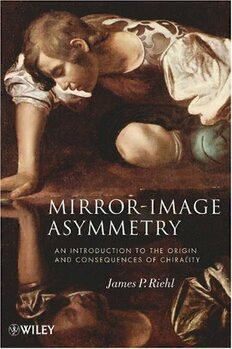
Mirror-image Symmetry PDF
273 Pages·2010·2.904 MB·English
Most books are stored in the elastic cloud where traffic is expensive. For this reason, we have a limit on daily download.
Preview Mirror-image Symmetry
Description:
An overview of the importance and consequences of asymmetry from molecules to the macroscopic worldAs scientists have become more capable of probing the structure of three-dimensional objects at the molecular level, the need to understand the concept and the consequences of mirror-image asymmetry—chirality—has increased enormously. Written at an introductory level, Mirror-Image Asymmetry provides an overview of the importance and effects of asymmetry from the atomic and molecular world of physics and chemistry to the organisms and structures that we see and use in our everyday life. The reader will develop a broad appreciation of three-dimensional asymmetry from the microscopic molecular world to the macroscopic world of handedness, automobile driving, windmills, sports, and similar phenomena. The book features:An introduction to basic definitions and the nomenclature of asymmetric and dissymmetric moleculesUp-to-date examples of the importance and consequences of asymmetry in modern drug applications, current theories of the origin of asymmetry in nature, and examples of molecular asymmetry in smell, taste, and insect communicationMany illustrations, chemical structures, and photographs that enable the reader to connect the actual asymmetrical structures to the different phenomena that depend on structural asymmetryIn the 150 years since Louis Pasteur discovered asymmetry in molecular structures, scientists have made great progress in understanding how interactions between chiral molecules influence biochemical processes. This knowledge is leading to very sophisticated asymmetric synthetic techniques that have greatly benefitted many research groups especially those in the pharmaceutical industry. This guide to the role of molecular and macroscopic chirality will inspire students and scientists in chemistry, biology, physics, and drug discovery.
See more
The list of books you might like
Most books are stored in the elastic cloud where traffic is expensive. For this reason, we have a limit on daily download.
